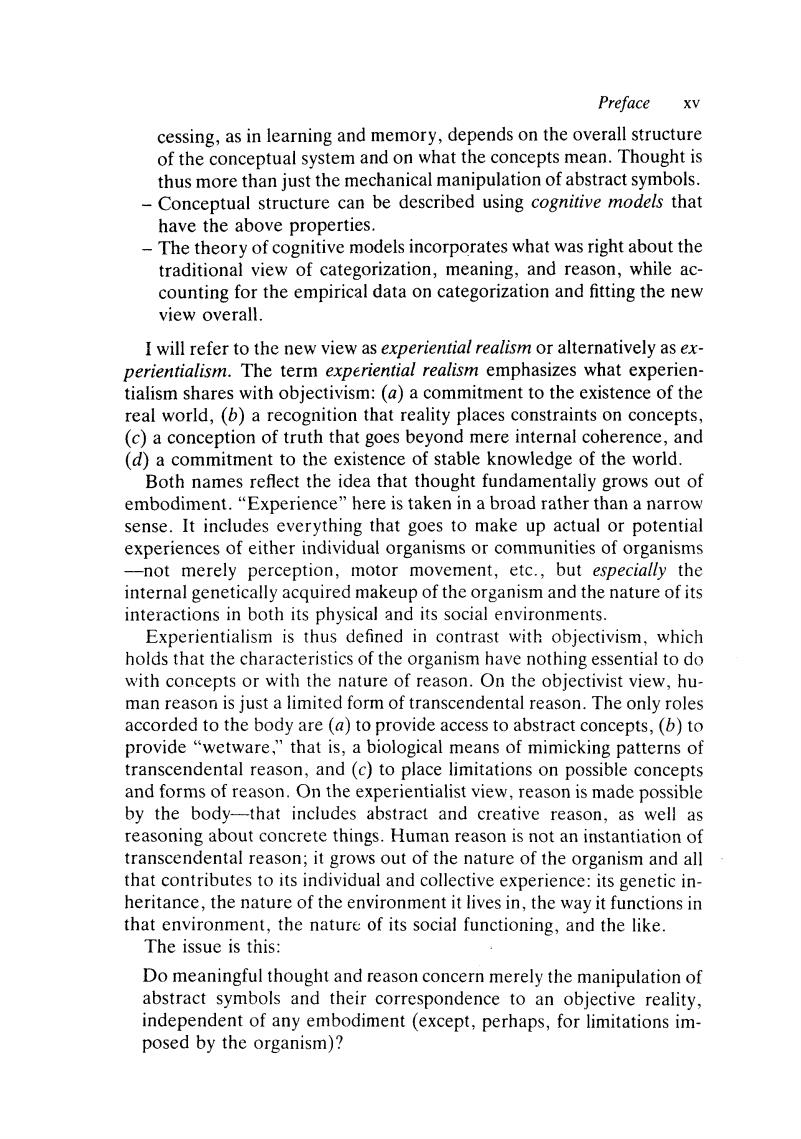正在加载图片...

Preface XV cessing,as in learning and memory,depends on the overall structure of the conceptual system and on what the concepts mean.Thought is thus more than just the mechanical manipulation of abstract symbols. Conceptual structure can be described using cognitive models that have the above properties. -The theory of cognitive models incorporates what was right about the traditional view of categorization,meaning,and reason,while ac- counting for the empirical data on categorization and fitting the new view overall I will refer to the new view as experiential realism or alternatively as ex- perientialism.The term experiential realism emphasizes what experien- tialism shares with objectivism:(a)a commitment to the existence of the real world,(b)a recognition that reality places constraints on concepts, (c)a conception of truth that goes beyond mere internal coherence,and (d)a commitment to the existence of stable knowledge of the world. Both names reflect the idea that thought fundamentally grows out of embodiment."Experience"here is taken in a broad rather than a narrow sense.It includes everything that goes to make up actual or potential experiences of either individual organisms or communities of organisms -not merely perception,motor movement,etc.,but especially the internal genetically acquired makeup of the organism and the nature of its interactions in both its physical and its social environments. Experientialism is thus defined in contrast with objectivism,which holds that the characteristics of the organism have nothing essential to do with concepts or with the nature of reason.On the objectivist view,hu- man reason is just a limited form of transcendental reason.The only roles accorded to the body are (a)to provide access to abstract concepts,(b)to provide "wetware,"that is,a biological means of mimicking patterns of transcendental reason,and (c)to place limitations on possible concepts and forms of reason.On the experientialist view,reason is made possible by the body-that includes abstract and creative reason,as well as reasoning about concrete things.Human reason is not an instantiation of transcendental reason;it grows out of the nature of the organism and all that contributes to its individual and collective experience:its genetic in- heritance,the nature of the environment it lives in,the way it functions in that environment,the nature of its social functioning,and the like. The issue is this: Do meaningful thought and reason concern merely the manipulation of abstract symbols and their correspondence to an objective reality, independent of any embodiment (except,perhaps,for limitations im- posed by the organism)?Preface xv cessing, as in learning and memory, depends on the overall structure of the conceptual system and on what the concepts mean. Thought is thus more than just the mechanical manipulation of abstract symbols. - Conceptual structure can be described using cognitive models that have the above properties. - The theory of cognitive models incorporates what was right about the traditional view of categorization, meaning, and reason, while accounting for the empirical data on categorization and fitting the new view overall. I will refer to the new view as experiential realism or alternatively as experientialism. The term experiential realism emphasizes what experientialism shares with objectivism: (a) a commitment to the existence of the real world, (b) a recognition that reality places constraints on concepts, (c) a conception of truth that goes beyond mere internal coherence, and (d) a commitment to the existence of stable knowledge of the world. Both names reflect the idea that thought fundamentally grows out of embodiment. "Experience" here is taken in a broad rather than a narrow sense. It includes everything that goes to make up actual or potential experiences of either individual organisms or communities of organisms -not merely perception, motor movement, etc., but especially the internal genetically acquired makeup of the organism and the nature of its interactions in both its physical and its social environments. Experientialism is thus defined in contrast with objectivism, which holds that the characteristics of the organism have nothing essential to do with concepts or with the nature of reason. On the objectivist view, human reason is just a limited form of transcendental reason. The only roles accorded to the body are (a) to provide access to abstract concepts, (b) to provide "wetware," that is, a biological means of mimicking patterns of transcendental reason, and (c) to place limitations on possible concepts and forms of reason. On the experientialist view, reason is made possible by the body-that includes abstract and creative reason, as well as reasoning about concrete things. Human reason is not an instantiation of transcendental reason; it grows out of the nature of the organism and all that contributes to its individual and collective experience: its genetic inheritance, the nature of the environment it lives in, the way it functions in that environment, the nature of its social functioning, and the like. The issue is this: Do meaningful thought and reason concern merely the manipulation of abstract symbols and their correspondence to an objective reality, independent of any embodiment (except, perhaps, for limitations imposed by the organism)?